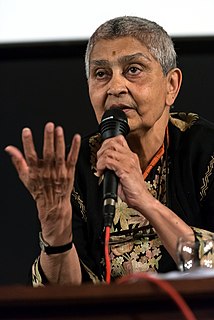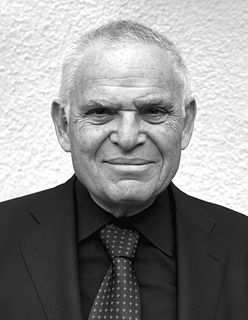
The German concept of Lebensraum comprises policies and practices of settler colonialism which proliferated in Germany from the 1890s to the 1940s. First popularized around 1901, Lebensraum became a geopolitical goal of Imperial Germany in World War I (1914–1918) originally, as the core element of the Septemberprogramm of territorial expansion. The most extreme form of this ideology was supported by the Nazi Party (NSDAP) and Nazi Germany. Lebensraum was one of the leading motivations Nazi Germany had in initiating the Second World War and would continue this policy until the end of World War II.
Geopolitics is the study of the effects of Earth's geography on politics and international relations. While geopolitics usually refers to countries and relations between them, it may also focus on two other kinds of states: de facto independent states with limited international recognition and relations between sub-national geopolitical entities, such as the federated states that make up a federation, confederation or a quasi-federal system.

Karl Ernst Haushofer was a German general, professor, geographer, and politician. Through his student Rudolf Hess, Haushofer's conception of Geopolitik influenced the development of Adolf Hitler's expansionist strategies. He coined the political use of the term Lebensraum, which Hitler adopted in Mein Kampf and used to motivate global Nazi expansionism and genocide. Under the Nuremberg Laws, Haushofer's wife and children were categorized as Mischlinge. His son, Albrecht, was issued a German Blood Certificate through the help of Hess.

Gayatri Chakravorty Spivak is an Indian-American scholar, literary theorist, and feminist critic. She is a University Professor at Columbia University and a founding member of the establishment's Institute for Comparative Literature and Society.

The Eurasia Party is a Russian political party. It was registered by the Ministry of Justice on 21 June 2002, approximately one year after the pan-Russian Eurasia Movement was established by Aleksandr Dugin.

The Sino-Soviet split was the breaking of political relations between the People's Republic of China and the Soviet Union caused by doctrinal divergences that arose from their different interpretations and practical applications of Marxism–Leninism, as influenced by their respective geopolitics during the Cold War of 1945–1991. In the late 1950s and early 1960s, Sino-Soviet debates about the interpretation of orthodox Marxism became specific disputes about the Soviet Union's policies of national de-Stalinization and international peaceful coexistence with the Western Bloc, which Chinese founding father Mao Zedong decried as Marxist revisionism. Against that ideological background, China took a belligerent stance towards the Western world, and publicly rejected the Soviet Union's policy of peaceful coexistence between the Western Bloc and Eastern Bloc. In addition, Beijing resented the Soviet Union's growing ties with India due to factors such as the Sino-Indian border dispute, and Moscow feared that Mao was too nonchalant about the horrors of nuclear warfare.

Sir Halford John Mackinder was an English geographer, academic and politician, who is regarded as one of the founding fathers of both geopolitics and geostrategy. He was the first Principal of University Extension College, Reading from 1892 to 1903, and Director of the London School of Economics from 1903 to 1908. While continuing his academic career part-time, he was also the Member of Parliament for Glasgow Camlachie from 1910 to 1922. From 1923, he was Professor of Geography at the London School of Economics.
Robert Strausz-Hupé was an Austrian-born U.S. diplomat and geopolitical theorist.
Geostrategy, a subfield of geopolitics, is a type of foreign policy guided principally by geographical factors as they inform, constrain, or affect political and military planning. As with all strategies, geostrategy is concerned with matching means to ends—in this case, a country's resources with its geopolitical objectives. Strategy is as intertwined with geography as geography is with nationhood, or as Colin S. Gray and Geoffrey Sloan state it, "[geography is] the mother of strategy."
Political geography is concerned with the study of both the spatially uneven outcomes of political processes and the ways in which political processes are themselves affected by spatial structures. Conventionally, for the purposes of analysis, political geography adopts a three-scale structure with the study of the state at the centre, the study of international relations above it, and the study of localities below it. The primary concerns of the subdiscipline can be summarized as the inter-relationships between people, state, and territory.

In postcolonial studies and in critical theory, the term subaltern designates and identifies the colonial populations who are socially, politically, and geographically excluded from the hierarchy of power of an imperial colony and from the metropolitan homeland of an empire. Antonio Gramsci coined the term subaltern to identify the cultural hegemony that excludes and displaces specific people and social groups from the socio-economic institutions of society, in order to deny their agency and voices in colonial politics. The terms subaltern and subaltern studies entered the vocabulary of post-colonial studies through the works of the Subaltern Studies Group of historians who explored the political-actor role of the men and women who constitute the mass population, rather than re-explore the political-actor roles of the social and economic elites in the history of India.
The basic concept behind critical geopolitics is that intellectuals of statecraft construct ideas about places; these ideas have influence and reinforce their political behaviors and policy choices, and these ideas affect how people process their own notions of places and politics.
The concept of imagined geographies originated from Edward Said, particularly his work on critique on Orientalism. Imagined geographies refers to the perception of a space created through certain imagery, texts, and/or discourses. For Said, imagined does not mean to be false or made-up, but rather is used synonymous with perceived. Despite often being constructed on a national level, imagined geographies also occur domestically in nations and locally within regions, cities, etc.

John A. Agnew, FBA is a prominent British-American political geographer. Agnew was educated at the Universities of Exeter and Liverpool in England and Ohio State in the United States.

Geoeconomics is the study of the spatial, temporal, and political aspects of economies and resources. Although there is no widely accepted singular definition, the distinction of geoeconomics separately from geopolitics is often attributed to Edward Luttwak, an American strategist and military consultant, and Pascal Lorot, a French economist and political scientist.

Regional organizations (ROs) are, in a sense, international organizations (IOs), as they incorporate international membership and encompass geopolitical entities that operationally transcend a single nation state. However, their membership is characterized by boundaries and demarcations characteristic to a defined and unique geography, such as continents, or geopolitics, such as economic blocs. They have been established to foster cooperation and political and economic integration or dialogue among states or entities within a restrictive geographical or geopolitical boundary. They both reflect common patterns of development and history that have been fostered since the end of World War II as well as the fragmentation inherent in globalization, which is why their institutional characteristics vary from loose cooperation to formal regional integration. Most ROs tend to work alongside well-established multilateral organizations such as the United Nations. While in many instances a regional organization is simply referred to as an international organization, in many others it makes sense to use the term regional organization to stress the more limited scope of a particular membership.
Klaus Dodds is Professor of Geopolitics at Royal Holloway, University of London.
Postcolonialism is the critical academic study of the cultural, political and economic legacy of colonialism and imperialism, focusing on the impact of human control and exploitation of colonized people and their lands. More specifically, it is a critical theory analysis of the history, culture, literature, and discourse of imperial power.

The Foundations of Geopolitics: The Geopolitical Future of Russia is a geopolitical book by Aleksandr Dugin. Its publication in 1997 was well received in Russia; it has had significant influence within the Russian military, police, and foreign policy elites, and has been used as a textbook in the Academy of the General Staff of the Russian military. Powerful Russian political figures subsequently took an interest in Dugin, a Russian political analyst who espouses an ultranationalist and neo-fascist ideology based on his idea of neo-Eurasianism, who has developed a close relationship with Russia's Academy of the General Staff.
Energy diplomacy is a form of diplomacy, and a subfield of international relations. It is closely related to its principal, foreign policy, and to overall national security, specifically energy security. Energy diplomacy began in the first half of the twentieth century and emerged as a term during the second oil crisis as a means of describing OPEC's actions. It has since mainly focused on the securitization of energy supplies, primarily fossil fuels, but also nuclear energy and increasingly sustainable energy, on a country or bloc basis.










